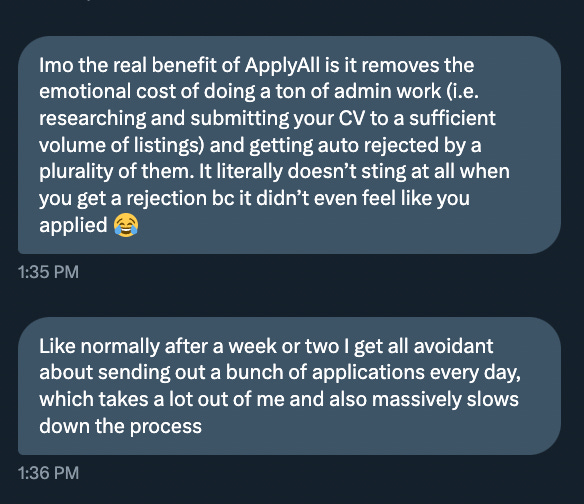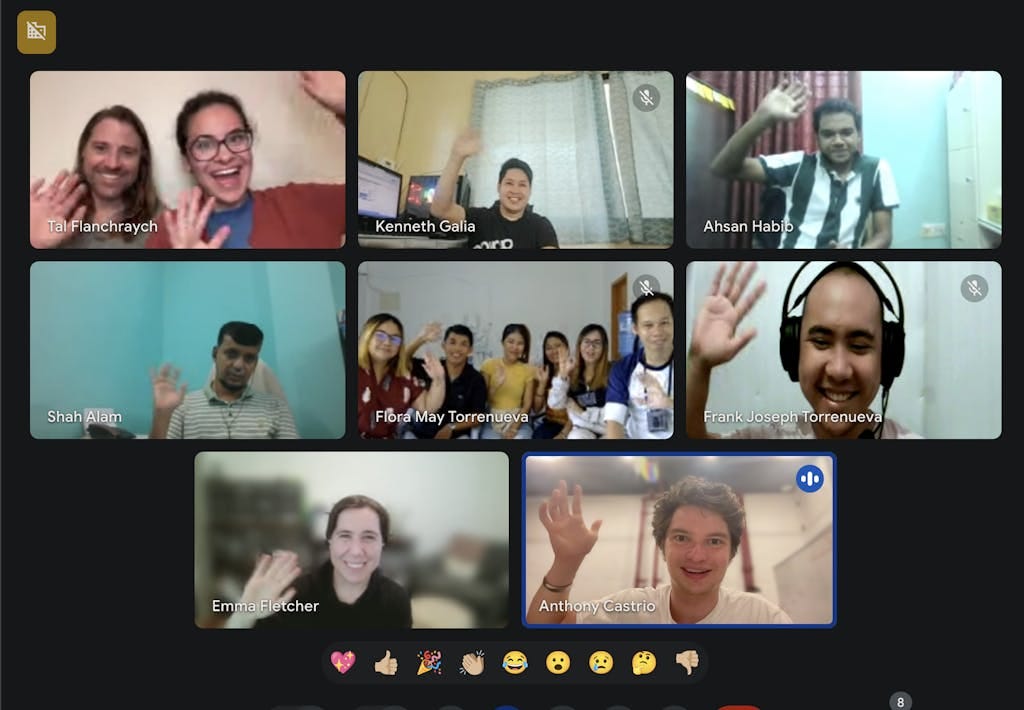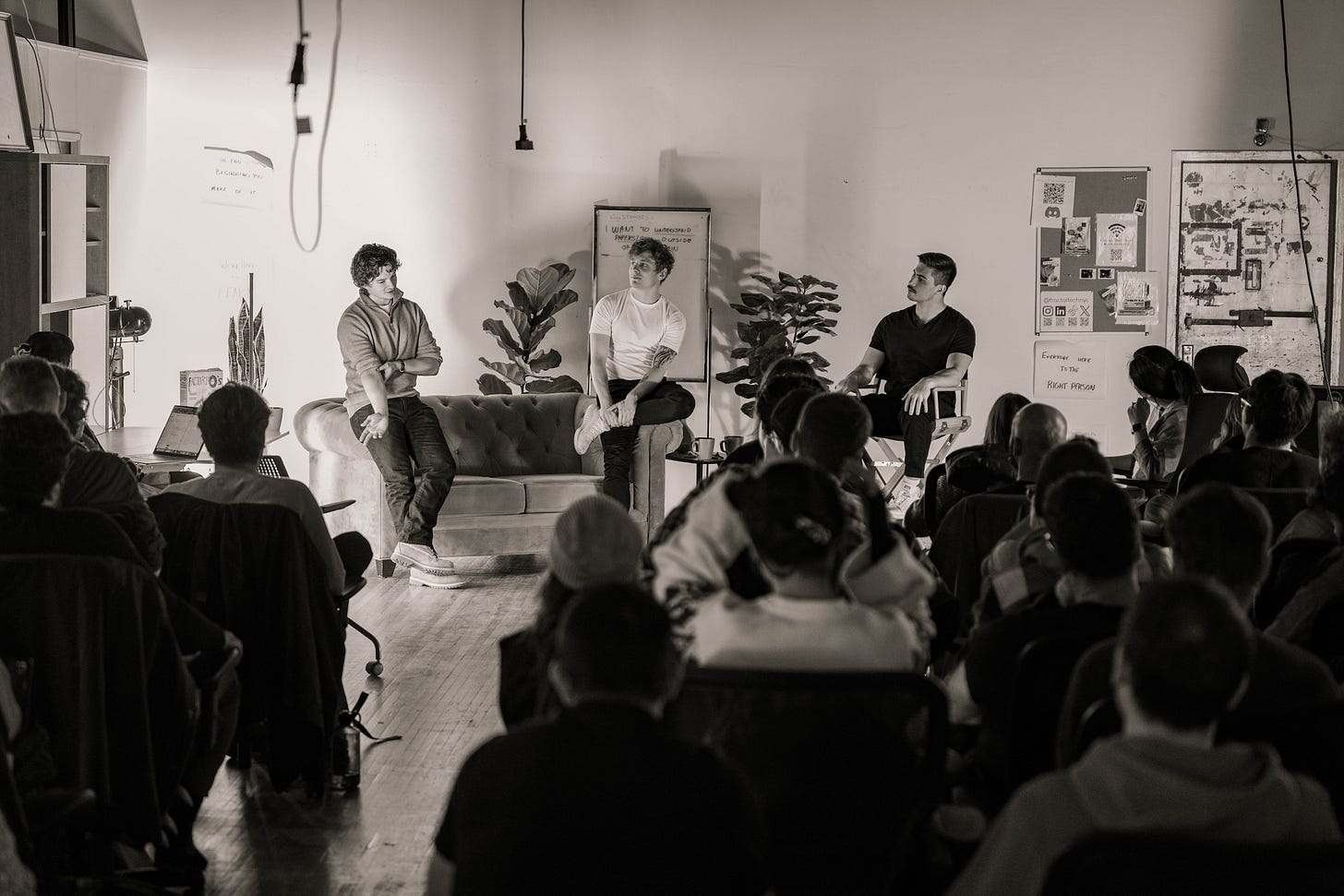Revenue grew from $14,143 to $32,470, but not much profit yet.
UPDATES: money stuff, got an apartment in NYC, & gave a talk at Fractal Tech.
Welcome back ya’ll.
It’s been five months since I started working on ApplyAll and four months since I published the story of how I got 12 job interviews in two weeks.
Here’s what I’ve been up to since then:
We doubled ApplyAll top-line revenue since I started (but it went back down).
Signed a lease on an apartment in NYC (my first annual lease in 5+ years).
Gave a talk at Fractal Tech NYC about how to bootstrap a startup (scroll to the bottom for the writeup).
Wait, what’s ApplyAll again?
We automate the job search. Any tech jobs in the USA: programmers, customer success managers, designers, product managers, etc. Currently we have 1.2M jobs in our database and for most tech roles we can fill out 100+ applications on your behalf in a matter of weeks. For programmers, designers, and CSMs we can fill out 200+ applications in a matter of DAYS. All we need is your resume & your search criteria.
Searching for a job sucks.
It takes 100s of applications just to get 1 or 2 offers.
You constantly put yourself out there just to get rejected over and over again.
It’s hard to find good jobs to apply for in the first place.
We do the grunt work of finding great jobs and filling out long applications, so you get more jobs offers, much faster, and without taking a daily psychological beating.
People think we do this using AI.
We actually do this with a team of 14 people (and growing!) who's whole job is to find great jobs and apply you to them. We use software (and yes, AI!) to make them faster and better at that job.
This is what we do on a daily basis:
Job seeker signs up with us.
We find 100+ jobs that are a great match for their skills & preferences.
We've built systems that automate almost everything:
Constantly scrape the web for new job posts and put them in our search database.
Match candidates with the most relevant open jobs.
Automatically submit an application on their behalf.
Interview requests get instantly forwarded to the candidate so they can reply right away.

You don’t have to apply to jobs anymore, jobs apply to you.
Job seekers get interview requests on auto-pilot. Often within a week they will have multiple interviews lined. The faster and better do our job, the more likely they are to leave us a review and tell a friend.
I really like working on a business that has such clear outcomes. You sign up for ApplyAll -> we get you job interviews. Our ultimate goal is to make getting a great job as easy and as fast as possible.
You'd think the fact that we don't have a subscription option would mean we don't have any recurring revenue, but actually it turns out a lot of people have to look for a job more than once in their life.
You get laid off again.
You land a job, but you hate your boss.
You like your job, but you want to see what else is out there.
We doubled ApplyAll top-line revenue since I started.
First order of business was cleaning house. We had poor visibility into where our money was coming and going, but we knew we weren't profitable. To fix this we:
✅ Set up accounting software.
✅ Set up product analytics and the ability to A/B pricing.
✅ Moved all income to 1 bank account & all expenses to 1 credit card.
We have <$1,000 MRR (monthly recurring revenue) and ~$20,000/month in one-time payments. Currently on track for $300,000 this year, all bootstrapped. We almost broke even in September and in October we had a new revenue record of $32,000. November we were back down to $22,000 and we failed to break even again.
What’s helped:
We can actually see our finances now. We’re using free accounting software called Wave and moved all our expenses on to a single corporate credit card that syncs all our transactions automatically.
We are getting more targeted in our marketing. It’s much easier for us to help out specific job-seekers like Software Engineers, Product Managers, and Customer Success Managers, so we are doubling down on our efforts to bring in those particular clients.
We’ve made our remote team of application-fillers more efficient. Those real people are expensive! The more we can automate from their workflow, the closer we get to consistent profitability.
What we are struggling with:
Onboarding is a big bottle-neck for us. We really really really want every customer to have an excellent experience with us and take the burden off them as much as possible. But that means we are doing a ton of work behind the scenes whenever someone signs up with us to craft the perfect job search for them, spot-check resume issues, and avoid any f*ck-ups like applying them to a company they already work for.
Tech-debt from Bubble. Bubble was an amazing platform for a solo non-technical founder to go from an idea to $10k/month in revenue. However it’s been a thorn in our side for scaling. Even worse: a lot of our data was in Google Spreadsheets as well. We are finally deprecating Google Spreadsheets this week, but Bubble itself is still a PITA that we often have to bend over backwards to work around.
Job market trends. The holidays are much slower for the hiring market and our growth was flat last month. We expect December to be flat as well and January to be a big growth month again.

One more thing - I was invited by Fractal Tech in NYC earlier this week to give a fireside chat on how to bootstrap a startup. Here's what I said:
1. The fastest way to $10,000 MRR is to get a job.
Keeping your 9-5, or doing consulting work on the side is a really smart way to not go broke while pursuing your dream of independence. Most people should not quit before their startup income at least covers your living expenses. It's much easier to make money when you're not broke.
2. Pick the most painful and expensive problem you can to solve.
There are many things in the world that can be improved, that would not make a good business. Your product or solution has to be worth enough money not only for someone to pay for it, but for them to take the time to learn how to use it.
3. Solve a problem before you engineer a solution.
I see way more founders succeed when they start by solving a problem and leave the engineering for later. Many great products don't need any prototype at all to market-test. All you need is a solution to a problem and a way to charge your customer.
4. You're probably overthinking marketing.
A perfectly reasonable marketing strategy for a new idea is to talk to 100 people. Find their email. Find their LinkedIn. Ask them about their problems. Offer your solution. Ask them if they'll pay you to solve their problem. That's all you need to do to get your first couple of customers.
5. You're probably underthinking distribution.
More ideas fail because they never found a cheap distribution channel than because they were too hard to build. Distribution is so important it's worth thinking about before anything else. e.g. if you wanted to grow on LinkedIn, think "what would be the easiest possible product to promote on LinkedIn?" and consider building that as either a free tool to market your main product or potentially as the main product itself.
6. If you have too many ideas, timebox.
Pick one idea and give yourself one month to get your first customer. This gives you the freedom to focus entirely on one thing for long enough to see if it has any legs at all. After the month is up you can throw it out and try a new idea. If you can't build and sell a version of your product in one month, then you might be overthinking the scope, pair it down.
7. If you don't have enough ideas, talk to customers.
Pick an industry you want to work in. Talk to everyone you can in that industry. Read the Mom Test. Ask them about their problems. What do they spend money on? What is the worst part of their job? Those are startup ideas.
8. Doing it the first time is hard, doing it again is easy.
Once you've had some success you will find it really easy to grow your next project to the same size... and really hard to grow it any bigger. To get to the next stage you set bigger goals and talk to founders who've done it before.










Great update. I usually skim past my Substack newsletters but this one hooked my attention. I would like to hear more about how you build while having a full-time job. I've found I can only make progress on my projects when I'm unemployed – after working a 9-5 I want to get away from my computer screen and spend time outside, with friends, moving my body, etc., not doing more computer work.
Saw you talk at Fractal Tech! Love the advice - all of it is spot on, and lines up with my experience.